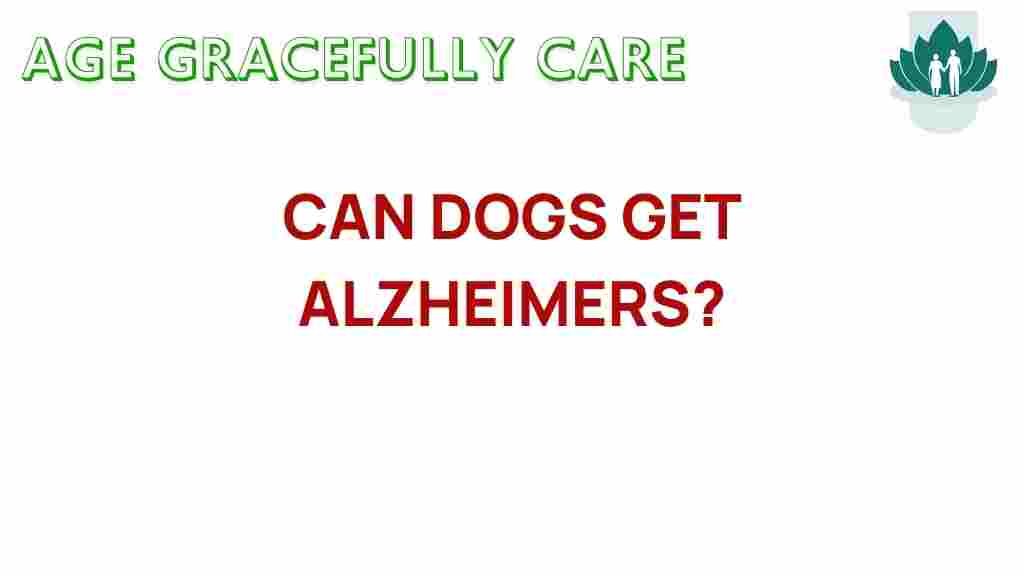Unraveling the Mystery: Can Dogs Get Alzheimer’s Disease?
Dogs, much like humans, can experience cognitive decline as they age. One of the most alarming conditions that can affect our beloved pets is a form of dementia often compared to Alzheimer’s disease in humans. In this article, we will explore the signs, treatment options, and ongoing research surrounding canine health and the possibility of Alzheimer’s in dogs. Understanding these aspects will empower pet owners to provide better care for their furry companions as they age.
Understanding Canine Cognitive Dysfunction
Canine Cognitive Dysfunction (CCD) is a syndrome that resembles Alzheimer’s disease in humans. It affects older dogs and leads to various behavioral changes. While the exact cause of CCD is still being researched, it is believed to be associated with brain aging, much like how Alzheimer’s affects humans.
Signs of Canine Cognitive Dysfunction
Recognizing the signs of cognitive dysfunction in dogs is critical for early intervention. Here are some common symptoms to watch for:
- Disorientation: Dogs may seem confused in familiar environments, such as getting lost in the house.
- Altered Sleep Patterns: Many dogs with CCD may sleep more during the day and be restless at night.
- Changes in Interaction: Affected dogs may show decreased interest in playing or interacting with their owners and other pets.
- House-Training Issues: Dogs may forget their house-training and have accidents in the home.
- Increased Anxiety: Signs of anxiety or agitation may become more pronounced, particularly during changes in routine.
- Repetitive Behaviors: Some dogs may develop repetitive behaviors, such as pacing or vocalizing excessively.
If you notice these signs in your dog, it may be time to consult your veterinarian for a thorough evaluation.
Diagnosing Canine Cognitive Dysfunction
Diagnosing CCD involves a comprehensive examination by a veterinarian. The process typically includes:
- Medical History Review: The vet will discuss your dog’s behavioral changes, physical health, and any medications they are taking.
- Physical Examination: A physical exam helps rule out other medical conditions that could contribute to behavioral changes.
- Behavioral Assessment: Your vet may use standardized questionnaires or behavioral assessments to gauge your dog’s cognitive function.
Treatment Options for Canine Cognitive Dysfunction
While there is currently no cure for CCD, several treatment options can help manage the symptoms and improve your dog’s quality of life:
- Dietary Changes: Special diets rich in antioxidants, Omega-3 fatty acids, and other nutrients may help support cognitive health.
- Medication: Certain medications, such as selegiline, can help improve cognitive function in some dogs.
- Environmental Enrichment: Engaging your dog with puzzle toys, training exercises, and social interactions can help stimulate their mind.
- Routine and Consistency: Maintaining a consistent daily routine can help reduce anxiety and confusion in dogs with CCD.
Research on Alzheimer’s in Dogs
Ongoing research into canine health and Alzheimer’s-like conditions in dogs is crucial. Studies have focused on understanding the biological processes behind cognitive dysfunction and finding effective treatments. Key areas of research include:
- Brain Changes: Investigating the presence of amyloid plaques and tau protein tangles in the brains of dogs, similar to what is seen in Alzheimer’s patients.
- Genetic Factors: Exploring whether certain breeds are more susceptible to CCD and identifying genetic markers.
- Behavioral Interventions: Evaluating the efficacy of behavioral therapies and training programs in improving cognitive function.
For more in-depth research findings, check out this external resource.
Pet Care Tips for Aging Dogs
As your dog ages, it’s essential to prioritize their health and well-being. Here are some pet care tips to help manage the effects of aging:
- Regular Veterinary Check-Ups: Schedule routine vet visits to monitor your dog’s health and catch any potential issues early.
- Physical Activity: Ensure your dog gets regular exercise to maintain physical health and cognitive function.
- Mental Stimulation: Engage your dog with training, games, and interactive toys to keep their mind sharp.
- Comfortable Living Environment: Provide a safe and comfortable space for your dog to rest and relax.
- Socialization: Keep your dog socially engaged with family members and other pets to reduce feelings of isolation.
Troubleshooting Common Issues
Despite your best efforts, your dog may still exhibit signs of cognitive dysfunction. Here are some troubleshooting tips to address common issues:
Disorientation
If your dog seems confused or disoriented:
- Keep furniture in the same place to help them navigate their environment.
- Use baby gates to limit their access to confusing areas.
Increased Anxiety
If your dog appears anxious or agitated:
- Provide a quiet, safe space for them to retreat to when feeling overwhelmed.
- Consider calming supplements or pheromone diffusers to help alleviate anxiety.
House-Training Issues
If your dog has accidents indoors:
- Increase the frequency of outdoor bathroom breaks.
- Use puppy pads in designated areas to minimize stress.
Conclusion
Understanding whether dogs can get Alzheimer’s disease is critical for pet owners, especially as their dogs enter their senior years. Canine Cognitive Dysfunction presents similar challenges to human Alzheimer’s, affecting the way dogs think, behave, and interact with their environments. By recognizing the signs of CCD, seeking veterinary assistance, and implementing effective care strategies, you can help your dog maintain their quality of life as they age. Remember, early detection and intervention are key in managing cognitive health in dogs.
For further information on canine health and wellness, check out our pet care resources.
This article is in the category Health and created by AgeGracefullyCare Team
